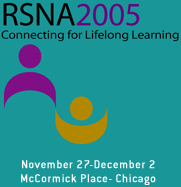
Abstract Archives of the RSNA, 2005
Allen Ho, Presenter: Nothing to Disclose
Purpose/Objective: While epigenetic mechanisms are generally accepted as important in cancer initiation and progression, the idea that they may play a role in therapeutic resistance is relatively new. The expression and regulation of DNA methylation are considerably altered in tumorigenesis, suggesting a direct role for methylation in the process of cellular transformation via gene silencing. In our model, the specific genes (pro-survival oncogenes) activated in the process of transformation are ultimately used by tumor cells to evade the cytotoxicity of anti-cancer agents. Since malignant transformation requires both the inactivation of genomic fidelity genes as well as the activation of pro-survival pathways, and methylation is involved in transformation, it seemed logical to suggest that methylation might additionally play a role in tumor resistance by activating pro-survival pathways. Materials/Methods: HeLa and HCT116 Cells were maintained in Eagle's MEM media with 10% FCS in tissue culture flasks. Hydrogen peroxide (H2O2) stock solutions were made in sterile phosphate-buffered saline. Cells were subjected to ionizing radiation (IR) using a 120 kv x-ray machine, innoculated in H2O2 solutions, or gassed with nitrous oxide to induce hypoxia. Methyl acceptance assay was performed by the method of Balaghi and Wagner (2002), and immunoreactive DNMT1 protein levels from whole cell extracts were determined using a standard method. Results: If cells are adapting to continuous oxidative stress by up regulating DNMT expression then it seems logical to determine if physiological or anti-cancer agents, that also induce oxidative stress, will transiently induce DNMT1 expression. As such, HCT116 and HeLa cells were treated with ionizing radiation, transient H2O2 exposure, or hypoxia, and both DNMT activity and protein levels were measured. These experiments showed that methyltransferase activity is significantly increased by exposure to ionizing radiation, H2O2, and hypoxia. In addition, Western analysis of DNMT1 protein levels also showed significant increase following exposure to ionizing radiation, hypoxia, and H2O2. The results of the experiments described above indicate that oxidative stress increases DNMT expression and activity, and thereby alters the expression of specific genes or gene families. Conclusions: It is well established that tumor cells use pro-survival signaling pathways to evade the damaging and cytotoxic effects of anti-cancer agents, including ionizing radiation. Since radiation induces oxidative stress, it seems reasonable that proteins increased by this stress may moreover play a role in resistance. This work suggests that the DNMT genes may be a new class of genes involved in resistance and that the epigenome may play an influential role in imparting tumor cell resistance.
Ho, A,
DNA Methyltransferase May Impart Resistance Against Agents that Induce Oxidative Stress Including Ionizing Radiation, H
2O
2, and Hypoxia. Radiological Society of North America 2005 Scientific Assembly and Annual Meeting, November 27 - December 2, 2005 ,Chicago IL.
http://archive.rsna.org/2005/4420565.html

